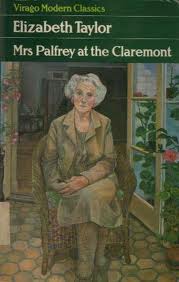Our book choice for June 2012 is Mrs Palfrey at the Claremont by Elizabeth Taylor. All but abandoned by her family in a London retirement hotel, Mrs. Palfrey strikes up a curious friendship with a young writer, Ludovic Meyer. Fate brings them together after she has an accident outside his basement flat.
On a rainy Sunday afternoon in January, the recently widowed Mrs. Laura Palfrey moves into the Claremont Hotel in South Kensington, London. The Claremont is a modest residence for elderly people, and Mrs. Palfrey is one of only a few residents who are still independent. The others are either too frail or too poor to live on their own, and they all have their own stories of loneliness and loss.
Mrs. Palfrey is a proud and independent woman, and she is determined to make the best of her new situation. She joins the hotel’s social club and tries to make friends with the other residents, but she finds it difficult to connect with them. They are all from different backgrounds and have different interests, and Mrs. Palfrey feels like an outsider.
One day, Mrs. Palfrey meets a young writer named Ludo Myers. Ludo is staying at the Claremont while he works on his latest novel, and he is immediately drawn to Mrs. Palfrey’s kindness and intelligence. The two of them strike up an unlikely friendship, and Ludo begins to use Mrs. Palfrey as inspiration for his novel.
At first, Mrs. Palfrey is flattered by Ludo’s attention, but she soon begins to feel uncomfortable with the deception. She knows that she is not Ludo’s grandmother, and she worries that he will eventually discover the truth. However, she is also afraid of losing his friendship, and she decides to keep up the pretense.
As Mrs. Palfrey and Ludo grow closer, they begin to share their secrets with each other. Ludo tells Mrs. Palfrey about his troubled childhood and his struggles with alcoholism. Mrs. Palfrey tells Ludo about her marriage to a diplomat and her life as a diplomat’s wife.
Through their friendship, Mrs. Palfrey and Ludo begin to heal the wounds of their past. They learn to accept themselves for who they are, and they find new hope for the future.
Discussion Questions
- Were the characters believable?
- ‘When she was young, she had an image of herself to present to her new husband, whom she admired; then to herself, thirdly to the natives (I am an Englishwoman). Now, no one reflected the image of herself, and it seemed diminished . . .’ (p.3) How does this reflect the author’s view of identity? Do you think a feeling of self-esteem relies on others to reflect it?
- ‘The Claremont was rather like a reduced and desiccated world of school. Of course, the food was better; but, for grown-ups, would have been uneatable if it had not been.’ (p.24) Are there similarities between the Claremont and a school environment in terms of friendships, cliques, bullies, social pressures and rules?
- ‘We aren’t allowed to die here’ is a phrase that comes to have meaning through the book. What is the author saying about the nature of old age and death?
- Are Mrs Palfrey and Ludo friends? Or are they taking advantage of each other?
- Do you think the nature of Ludo and Mrs Palfrey’s relationship is romantic, maternal or simply platonic?
- To what extent do you think the relationship between Mrs Palfrey and Ludo is symbolic of cross-generational relationships? Or is the relationship between Mrs Palfrey and her daughter Elizabeth a more accurate example? Are the two relationships very different?
- How does the author use concealed feelings and emotions? How well do you think they are hidden?
- Why does the author include the character of Rosie? What does she represent?
- Is Mr Osmond a figure of sympathy or derision? Is he a ‘poor old sort of man’ as Mrs Palfrey first thinks or rather a ‘dirty old fellow’ as Mrs Burton announces?
- What does it mean that Ludo has used Mrs Palfrey as a basis for his book and that, just before her death, Mrs Palfrey confuses Ludo with the real Desmond?
- What effect did the portrayal of Mrs Palfrey’s death have on you? Do you think its handling was effective?
- Has the book made you reflect on your own aging process and mortality?
- Would you recommend the book? If so, to whom?
Individual Ratings
DKB Rating 




EmmaT Rating 




Miranda Rating 




EmmaJ Rating 





